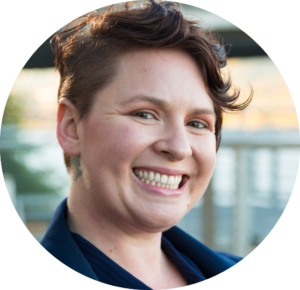August 9, 2020
By Kendra Pink, CPS Community
 Five years ago, when I was first introduced to the concepts of partnership, I was firmly entrenched in the responsibilities of wife, mother, employee, and student. As I viewed my life within this new lens I was faced with an uncomfortable and humbling truth: I had been conditioned to respond to and reinforce domination across all aspects of my relationships, starting with the one I had with myself. More disconcerting was the realization that I leaned far closer to the domination style than was comfortable. I began the difficult journey of uncoupling my conditioning with my ideals.
Five years ago, when I was first introduced to the concepts of partnership, I was firmly entrenched in the responsibilities of wife, mother, employee, and student. As I viewed my life within this new lens I was faced with an uncomfortable and humbling truth: I had been conditioned to respond to and reinforce domination across all aspects of my relationships, starting with the one I had with myself. More disconcerting was the realization that I leaned far closer to the domination style than was comfortable. I began the difficult journey of uncoupling my conditioning with my ideals.
Fast forward to 2020, the same responsibilities (mostly) remain, but my truth and role within them has changed. My former marriage has transformed into harmonious co-parenting (three children under nine) and I am now doing work that allows me to develop relationships within a partnership framework?something which as an independent contractor is deeply rewarding.
We can build a better future, together, but that future must intentionally shed the layers of domination we have accumulated.
As the effects of COVID-19 were beginning to be felt in my local community, I experienced simultaneous and direct contrasts in outcomes when approaching difficulties through partnership rather than domination. One in business, the other at home.
As school and work closures rippled across the country, my former spouse and I came together to communicate and strategize how we would adjust our daily rhythms to adapt to these changes. While our joint focus was the children we shared, we were able to be compassionate, forgiving, and accommodating to each other?s individual needs and wants.
At the same time, a professional counterexample presented itself. An agency with which I had contracted was faced with layoffs, leaving one client feeling discouraged and displaced enough to ask whether the agency relationship was salvageable and inquired about a more direct arrangement with me. Just me. I understood the client?s concerns as well as the difficult internal decisions the agency was facing. I believed there was a way for the three of us to come together and create a solution that was sensitive to the current situation, ensured the client was properly supported, and maintained the client-agency relationship.
It became clear there was a mismatch in the way we wished to partner on this challenge; the agency viewed me as a commodity which they owned and controlled and the client as a prize to be fought over and won. While I was operating with a focus on partnership, the agency was stuck in domination, meeting my facilitation with fear and attempting to increase their control. This manifested via typical domination strategies: aggression, and general, thinly veiled threats of force. As such, I necessarily ended my relationship with an organization that was unwilling to perceive our challenge as a beautiful opportunity for us to flex our complimentary muscles and pivot together to meet our shared needs.
While these agency discussions were taking place, I had met with my former spouse to build a foundation of safety and consistency that emotionally cradled our children during the pandemic upheaval and allowed both of us to show up as the parents we wanted to be, while also giving us the individual space we needed to nurture ourselves. I continue to be in awe of the ways our relationship as former spouses has blossomed in the past months, with partnership as it?s bedrock. We can build a better future, together, but that future must intentionally shed the layers of domination we have accumulated.
Now is the time to live our partnership principles. Now is the time where those ready to listen will hear our clarion call to gather and act in ways that move our relationships toward partnership and a shared commitment to building communities of access and equity and contribution. Sometimes it is beautiful but mostly unnoticed, like the unfolding wings of a newly emerged butterfly. Other times it may be loud and painful and necessitate separation. But as I see my children?s faces and picture the world I will be leaving them, I can attest the effort towards partnership will always be worth it.
Kendra Pink is a certified Caring Economy Advocate and revenue operations strategist in Portland, Oregon. She utilizes data to help organizations visualize the efficacy of their inputs towards measuring what matters and actively works to adjust power imbalances across education, real estate, and healthcare.? By implementing solutions that allow organizations to frame questions through a partnership lens and mapping to a baseline, her clients can adjust their actions for more partnership-oriented outcomes. She can be found on LinkedIn or the web.



Leave a Reply